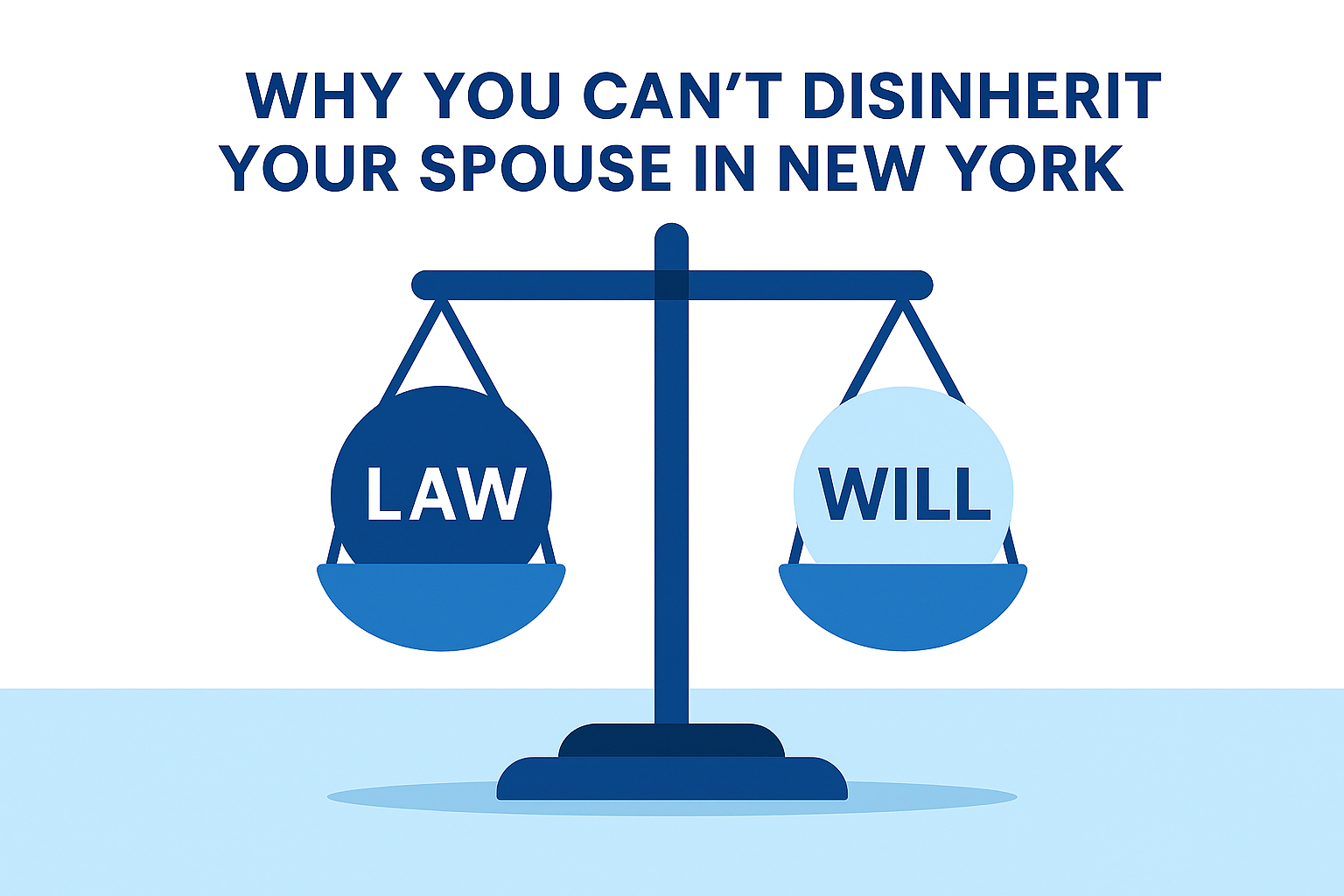Understanding your spouse’s statutory right to a share of your estate — and how proper planning can help protect your intentions.
The Reality of Spousal Rights in New York
In New York, no one can simply “cut out” their spouse from an estate.
Even if your Will, Trust, or financial accounts name someone else, your surviving spouse is entitled by law to a share of your assets. This rule — known as the spousal elective share — exists to protect surviving spouses from financial disinheritance.
Under New York Estates, Powers & Trusts Law §5-1.1-A, a surviving spouse is entitled to the greater of $50,000 or one-third (⅓) of the decedent’s net estate. This includes assets that many people assume are “outside” the estate, such as:
- Jointly owned bank accounts or real estate
- Assets in Revocable (Living) Trusts
- Retirement plans and life insurance policies with named beneficiaries
- Property transferred shortly before death
In other words, nearly all assets count — not just those listed in a Will.
Why You Can’t Simply Disinherit Your Spouse
Even if your estate plan clearly names other beneficiaries, your surviving spouse has a statutory right to claim their elective share.
Unless they have formally waived this right in a Prenuptial or Postnuptial Agreement, New York law presumes they are entitled to this one-third share.
That means:
- A Will leaving “everything to the children” may still result in your spouse receiving part of your estate.
- Beneficiary designations and jointly owned property can be pulled back into the elective share calculation.
- Trust arrangements can be challenged if they effectively disinherit the spouse.
These outcomes often surprise families — especially in second marriages or blended families — where someone intends to leave assets to children from a prior relationship.
How Prenuptial and Postnuptial Agreements Change the Picture
The only way to override the elective share in New York is through a legally enforceable marital agreement.
A Prenuptial Agreement (signed before marriage) or a Postnuptial Agreement (signed after marriage) can include a clear, notarized waiver of spousal inheritance rights. To be valid, the agreement must:
- Be in writing and signed by both spouses;
- Be acknowledged before a notary public (just like a deed); and
- Include full and fair financial disclosure, so that both parties understand what rights they are waiving.
Without such an agreement, courts will presume the surviving spouse is entitled to the elective share, regardless of your intentions.
Planning Ahead: Protecting Both Your Assets and Your Wishes
Effective estate planning doesn’t mean excluding your spouse — it means clarifying expectations and ensuring your wishes are carried out lawfully.
A strong plan may include:
- A Prenuptial or Postnuptial Agreement that addresses inheritance rights and property ownership.
- A comprehensive Will or Revocable Trust that coordinates with marital agreements.
- Consistent beneficiary designations on retirement accounts and insurance policies.
- Ongoing communication between spouses and counsel to update documents as financial circumstances change.
Taking these steps can prevent disputes and protect your family from uncertainty later on.
Understanding your spouse’s automatic right to inherit under New York law
New York law protects surviving spouses from being completely disinherited — even with carefully crafted estate documents.
If your estate plan involves complex family dynamics or specific inheritance goals, it’s essential to plan ahead.
Contact Sverdlov Law PLLC today at www.sverdlovlaw.com or 212-709-8112 or book a time on our calendar https://calendly.com/rochelle-sverdlovlaw/15min for a FREE evaluation of your case and get started with a plan tailored to your family’s needs.
This information is provided as a general overview and does not constitute legal advice. For personalized guidance, consult a New York special needs attorney.


